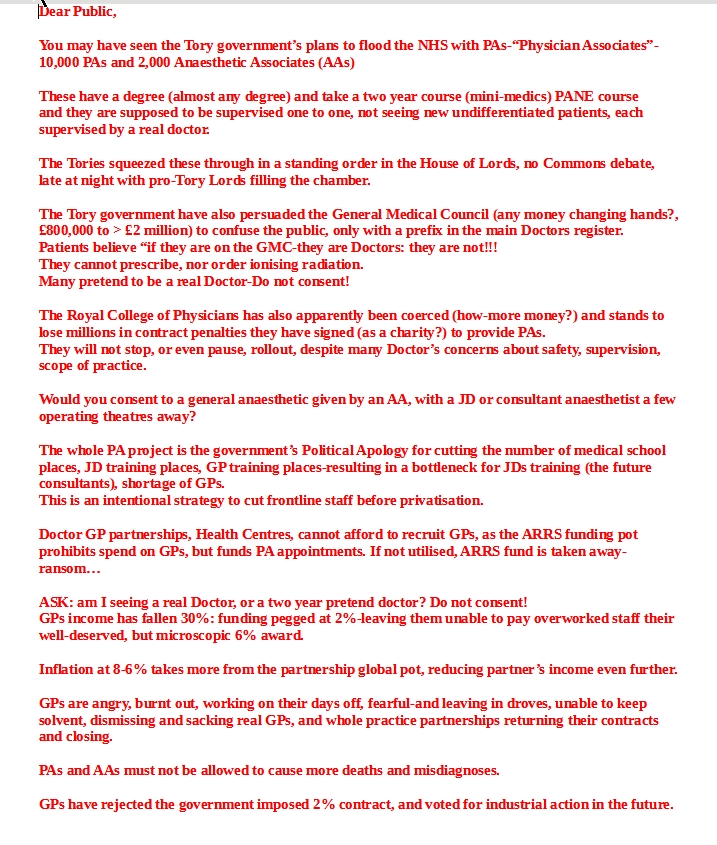
September 2024 blog


Assumptions:
The NHS is the United Kingdom's greatest achievement.
No government has ever achieved a prudent surplus of doctors, nurses, beds, diagnostics under the real NHS-always cutting Doctors, Beds....
Publicly funded through taxation is the least expensive, most efficient, equitable system
US private health insurance schemes
-limit, deny, ration, cut and treatment, have huge administration,
billing, costs,and involve disputes and fights over copayments, topups,
or rationing treatment,
-lead to half a million bankruptcies every year.
-Costs of ambulance services, costs of
drugs, costs of treatment are huge.
Many do not have any insurance.
Labour won the election because voters wanted the Tories OUT, not wanting Labour IN...!!!
By promoting CHANGE, they can now change anything they want-arguing voters voted FOR change...
Care in the comunity: severe mental health
Many old, cruel, Victorian asylums were demolished: correct decision.
Nevertheless, acutely psychotic patients, capable of harming, need secure treatment
hubs where they can be asessed and treated kindly but firmly:
mental patients do not like
-admitting they are severely ill,
-families are not questioned or consulted,
-patient wishes (I want to take my pills at home etc) are prioritised:
-Some patients should be given depot injections rather than volunteering
to self medicate.
-All this requires more psychiatrists, mental nurses and investment-to
avoid tragedies like Nottingham and others
General Practice
Partnerships can, and do, go bankrupt. Like Micawber, expenses above income, misery
Many GP health centre partnerships HAVE gone bankrupt, and "handed back
their contracts"
leaving 10,000 patients to be absorbed by surrounding equally struggling practices
CORE FUNDING MUST BE INCREASED 1.9% is too low... GPs should have their full pay after expenses are deducted from gross income.
The present system of GP payments is arcane, complex and crazy-as is Junior Doctors pay calculation...
MORE GPs must be RECRUITED, TRAINED, RETAINED-not driven to burnout, depression, suicide, early retirement or emigration...

NHSENGLAND should stop driving GPs out, stop inserting 22,000 Politician's Apologies-half trained quacks to fill the governments failing in unfilled vacancies.
Next epidemic
There must be up to date databases of qualified, reputable suppliers of logistics, PPE, drugs, ventilators etc, and a prudent surplus of staff, PPE, beds
Above all, firstly, full pay restoration, then secondly fair pay awards for frontline staff by a really independent DDRB-not dictated by government as puppets...
Do NOT use private dubious companies
Recover Di Dos £37 billion pounds
Emergency!!! New Strategies emerging:
Neo liberal "think" tanks like Tufton Street, IEA, propose totally batshit daft policies...
Don't need Doctors-anyone can do it...
Wes Streeting say he will use far more private firms: taking
money and staff from the NHS, at higher cost, less effective outcomes-to generate
profit, not great quality treatment.
They do not have the required capacity.
Darzi proposed polyclinics-which were privately owned, privately
run-and horrendously expensive...
I suspect more "Comunity Hubs"-seperate from GP surgeries, privately
owned, privately run, by dozens of PAs, unsupervised by any real GP Doctor...
Remember-a private operator's first duty is to its shareholders-profit, rather than best patient care...
Blair
now proposeds to end all GPs, and rely on super care centres-with computerised
chatbots replacing real people.
Remember how sucessful (useless chatbots are dealing with firms like Tom Tom,
etc FAIL!
Comunity hubs-privately owned, privately run, stuffed with quack PAs, not supervised by real GPs...


Right wing neoliberals influence healthcare:
Tufton Street: right wing neoliberals
There are many right wing neoliberal "think tanks",the IEA, many with weird ideas like, Kate Andrews, Thiel, Farage-
"we do not need Doctors"-"Anyone can do it..."
"End the NHS and force US style private health insurance"
These seem to influence both Tory and Labour governments: BEWARE!!!
Care Home Fees
The cost of care home fees means that your house, paid for out of taxed, earned income, can be swallowed up in a year or two: say £66,000 every year...
there are legal schemes which involve putting your house(s) in Trust for a child or relative, to
protect yor home from care home fees...This measure is strangely, not advertised by government...


NHS Dentistry...!!!
Government have been so short of money that they totally abandoned NHS dentists-with the cost-limiting UDA (units of dental activity) contract imposed by Noah from the Ark...
Dentists need financial balance to run their practices-gas, electric, staff wages, laboratory bills
These expenses should be individually reimbursed.
The item of service fees should reflect
the time, skill and expense of providing decent quality treatment, not Ratners
quality...
Weighted capitation is a total waste of spce, a copout by the ineffective BDA!
If not provided in a decent contract, dentists will, and have, abandoned the NHS.
I wanted to provide decent NHS treatment for every patient-especially the poorest-who probably had not been treated well previously: these are now abandoned-
A dentist's first duty is to the patient-not to the government...
the rich will always obtain good treatment to whatever standard they can afford... see below...

This practice is superb-well qualified
staff, computer-generated crowns, implants etc,
bestcomputerised x-ray, patient cameras and records-
but can a poor patient afford £600 for a chrome denture,
or £275 for a large acid etch white filling???
JUlia Patterson EveryDoctor
With the NHS in a state of emergency, we can find our attention pulled in multiple directions. NHS waiting lists are unbelievably long. A and E departments have had their busiest Summer ever. GP services have been woefully underfunded. But there’s another emergency requiring attention too, and this is the situation in social care…
Let's talk about the emergency in social care…
“Social care, like healthcare, is not a burden but instead an investment
into building a better, healthier society”
There are already rumblings from experts and frontline NHS staff about what
might happen in healthcare this winter. I’m starting to feel incredibly
worried; I hear from a large number of doctors and others about the state of
affairs on the frontline, and there are patterns emerging in the information
being shared with me from staff around the country. They describe things as
“intense”, that there’s “no let-up”, and many
say that the intensity of work has felt as bad during the summer months as it
often does during winter.
I think about the patchwork of NHS services across the UK like one of those old-fashioned maps on a wall, one with tiny bulbs criss-crossing its surface and lighting up when attention is needed. When conditions change - for example, when there is an increased burden of respiratory illness in the community, or rising waiting lists - things heat up and the bulbs start flashing. I’ll hear from one or two people about what’s happening at first, but most remain quiet. When the situation escalates, more and more staff get in touch, and the tone of their voices changes too, registering their alarm. The bulbs flash in crops with increasing frequency, lighting the country up, red for emergency.
It’s horrible to accept, but over the years I have come to learn that most media outlets wait until the whole board is red before they sound the alarm. They’re interested in covering the human tragedy as it unfolds in hospital ambulance bays and A&E departments, but don’t draw attention when there is still time to avert those tragedies. I have also learned that many politicians ignore the warnings, even as they’re coming in thick and fast. But NHS staff are not prone to panic, nor are they prone to exaggeration, and so it should be with alarm that our leaders see that chequerboard of bulbs starting to light up again, as we enter September 2024. This new government needs to do things differently - things are already bad, they’re getting worse, and unless immediate action is taken, we could be in for a very dangerous winter in the NHS for all patients.
With so many things going wrong in our public healthcare system, it’s easy to find our attention pulled in multiple directions. Primary care services have been woefully underfunded. A&Es are overcrowded. The waiting lists get longer and longer. But there’s another situation, one less at the forefront of public attention that has been getting worse for a very long time, and it deserves our attention now.
The crisis in social care has become a sticky situation for politicians in recent
years. Its enormity makes it difficult to understand and confront and it’s
also divisive, meaning that it’s not convenient for politicians to talk
about. How much social care funding should be provided for those in need? What
proportion of a person’s savings should be safeguarded against the care
needs they may have? All of their money? Only part of it? And, in an ageing
population, which groups of people should be prioritised with rising demand
and a diminishing care workforce?
These are difficult questions which have waited far too long for a proper public conversation. Instead, we have had ambitious, empty promises for much of the past decade. Who can forget Theresa May and the “dementia tax” fiasco, or Boris Johnson, who loftily claimed in his first speech as PM: “My job is to protect you or your parents or grandparents from the fear of having to sell your home to pay for the costs of care and so I am announcing now – on the steps of Downing Street – that we will fix the crisis in social care once and for all with a clear plan we have prepared to give every older person the dignity and security they deserve”
We all know that despite his bravado and pomp these words didn’t come to fruition. In fact, in 2024, the situation is worse than ever. The Kings Fund published a report recently which explains the size of the social care sector:
“There are 1.5 million people working in adult social care in England,
in 1.2 million full-time equivalent jobs (both similar to the NHS). This includes
approximately 860,000 care workers, 83,000 senior care workers and 33,000 registered
nurses. Most social care staff are employed by small and medium-sized private
providers (of which there are around 18,000 in total). There are also approximately
130,000 roles directly employed by individual users of care services.”
…but despite the enormous need for social care, the workforce is shrinking, and we are currently missing around 165,000 staff.
Work in the care sector is often incredibly intense, there is inadequate pay and training opportunities for those pursuing it as a career, and inadequate support for those caring for their loved ones. I hear from many carers who feel both isolated and under enormous financial and emotional stress. There is also a huge gap in many peoples’ understanding about whether they qualify for any support in paying for social care, and what they can access.
The Kings Fund report states that:
“In 2022/23, local authorities received around two million requests for
support from new clients – 612,000 from working-age adults and 1.39 million
from older people. In 2022/23, 836,000 people (543,000 older people and 293,000
working-age adults) received publicly funded long-term social care, primarily
in residential/nursing homes or in their own homes. In addition, there were
225,000 episodes of short-term care provided. Overall, around 42% of requests
for support result in some form of service. A further 27% receive advice or
signposting, and 31% receive nothing.”
Like many tough situations in our society, those affected don’t have much representation in our mainstream media. Huge numbers of people are suffering, often silently, within a system which simply isn’t fit for purpose. When the conversation does reach the mainstream media, it is often because this growing problem is now having an impact on other services, and this includes the NHS.
We have a problem in NHS hospitals, often unsympathetically referred to as “bed-blocking”. When a patient is ready for discharge, the team caring for them has to ensure that they will receive the on-going support they require, either at home or in another facility (for example a care home). Because social care services are so stretched, it can take an exceptionally long time to set up a patient’s on-going care, delaying the ability of the hospital team to safely discharge someone when their in-patient care is completed, and affecting NHS hospital bed occupancy (the delayed discharge impacts on the hospital’s ability to admit and treat new patients).
The problems are significant; for example in November 2022 The Guardian published a piece explaining that:
“As many as one in three hospital beds in parts of England are occupied
by patients who are well enough to be discharged, with a chronic lack of social
care meaning many do not have suitable places to go.”
A year later, BBC covered the situation in November last year, saying:
“BBC research has revealed that in some hospitals in the North West, fewer
than one in 10 patients who could go home are able to leave. It is mainly because
of a lack of social and community care provision and it is leaving thousands
of patients stuck in hospital when they should be somewhere else.”
It is a terrible situation for everyone involved; the people requiring care, the carers themselves, the people running NHS services, the patients waiting for treatment. It needs to get sorted out, and so all eyes are on the Labour government to find a solution.
In the run-up to the General Election, many people scrutinised the manifestos from each political party to find out what their plans were for social care, and the general consensus was that the Lib Dems had the most impressive plans. For their part, Labour committed to several things. They committed to the “spending caps” that had been planned by the Conservative government, due to begin in autumn 2025, which promised to limit the financial burden absorbed by people requiring care. They also included a new initiative, which is described within their election manifesto like this:
“Labour will undertake a programme of reform to create a National Care Service, underpinned by national standards, delivering consistency of care across the country.”
It’s been said that the ideas for the National Care Service have been derived from a report published by The Fabian Society last year - you can read it here.
Before the General Election in July, the Institute for Fiscal Studies voiced their concerns about the political party manifesto pledges. As the BBC reported at the time, “think tank warning of …a £4bn ‘hole’ in the social care plans of the three main parties in England.” It seems they were right to be worried. Just weeks after Labour won the General Election, they dropped their plans for the social care spending cap, and also cancelled a training fund for social care staff which had been put in place by the Conservative government.
The new Labour government has been blaming their changing policy commitments on the Conservatives because of the current poor state of the public finances, and it is undeniable that they are balancing many competing demands when it comes to the public purse. But it is still extremely concerning to see Labour drop these plans so quickly, particularly as we move into the colder months. In fact, they shouldn’t be dropping progressive plans for the social care sector; they should be pledging more. More funding, more support for staff, and more support for unpaid carers too.
The provision of care is the provision of dignity to many vulnerable people
in our society. Social care, like healthcare, is not a burden but instead an
investment into building a better, healthier society, which will be more productive
and economically healthy in turn. We need leaders who recognise this and who
prioritise the health and the care of the millions of people who need it. As
those bulbs flash brighter over the coming months across the board, becoming
a speckled landscape of need, let us demand action from our politicians. We
will all need care at one time or another, and we all deserve better than this.